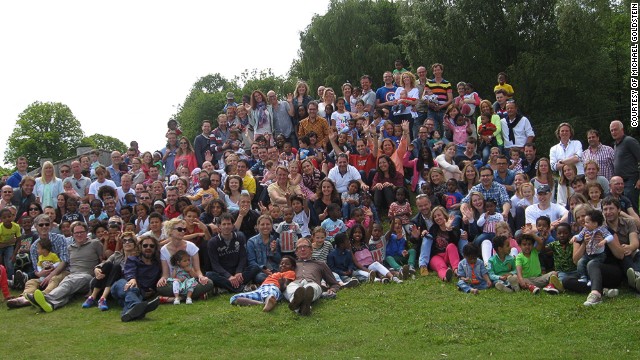 |
Seventy Dutch families who adopted U.S. kids gather for an annual Fathers Day picnic in June.
|
On the United Nations Gender Equality Index , the Netherlands is number one, followed by Sweden, Switzerland, Denmark, Norway, Germany, Finland, Slovenia, and France: the US is ranked at 42 (just behind Albania and tied with Hungary). In addition, the US has the highest rate of imprisonment in the world (25% of the world's prisoners are in the US), while the Netherlands ranks 163. Moreover, blacks, mainly males, make up one million of the 2.3 million in US jails, imprisoned at six times the rate of whites. While the US is building prisons, the the Netherlands is closing them. For mothers placing their black children with new 'forever families,' based on this information, their belief in chances of a better life in Holland vs. the US looks well-founded.
The Netherlands also boasts less income inequality, as do other developed nations in comparison to the US (see below). In addition, efforts to increase racial inequality in the US is a continuing story. A CNN Money infographic shows blacks at the lowest end of the racial wealth income gap. Lack of home ownership and financial investments are contributing factors.
Of course, white families in America do adopt black children too - including, recently, several well-known celebrities like Charlize Theron and Sandra Bullock. In these and other families, most kids do just fine; but, in others, adopted children may face problems in sorting out their racial identity.
Darron Smith, author of "White Parents, Black Children: Experiencing Transracial Adoption," believes that few Whites are truly equipped to help Black children prepare for survival in America. Smith is quoted as saying, "You would need to change your circle of friends, move to an integrated neighborhood and unlearn the racist history you learned about being an American." In addition, while the National Association of Black Social Workers no longer oppose transracial adoption, they are concerned about keeping black families together.
Which brings us back to Holland.
Despite their often limited educational and financial circumstances, American mothers who place their children with Dutch families are keenly aware that their children will probably face less racial stigma and gain more social and economic opportunities living abroad in what they see are 'exotic locales.' After they are adopted, these mothers often have more open contact with their children and their new families. Regarding the placement of their black children with white families, these mothers also do not face the scrutiny of American blacks or whites whose history of racial relations is still evolving. From the looks of it, the choice of these mothers to 'go Dutch' seems like a very wise decision.
Click here for Sophie Brown's report, "Overseas Adoptions Rise - for Black American Children."
Or, continue reading below.
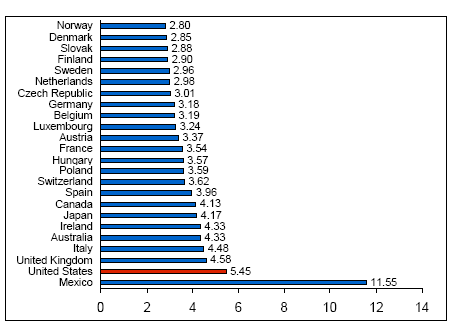
Global Income Inequality
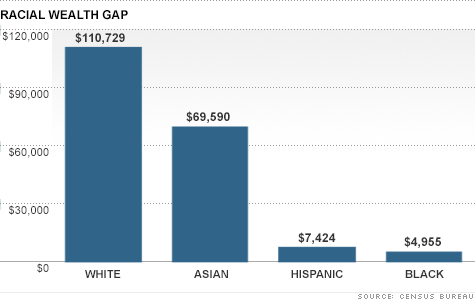
The Great Recession has widened the wealth gap, and race is a major factor.
Dutch Father's Day -- American style
This past June on
Father's Day, about 70 Dutch families who have adopted children from the
U.S. gathered at a park outside Amsterdam. The picnic is a time for the
children to celebrate their American heritage: "The kids are dressed
with a red, white and blue beret in her hair, if it's a girl, (or)
they're wearing New York Yankees t-shirts," said Michael Goldstein, a
New York attorney who facilitated the adoptions of the picnic attendees.
Among the families were
Marielle van den Biggelaar, a stay-at-home mom and her husband, Marnix, a
sales manager for a women's clothing brand, who adopted their two
children, Eva, four, and two-year-old Norbert as babies from Florida and
New York, respectively. "For the kids it's really important to see that
they're not alone and that all these kids have the same history, and
they're all adopted and they're all from the same country," Marielle
said.
"It's really nice to see
them all together and to talk to each other about experiences -- with
their hair and with their skin -- and they're all the same people with
the same mindset, so it's really fun for the kids and for us, as well." The couple encourages
their children to embrace their American origins, celebrating
Thanksgiving each year with other families who adopted children from the
United States. "We try to tell them about their culture and about their
background," said Marielle, who decided to adopt after years of
unsuccessful fertility treatment. "We would love them to (start
speaking) English when they're really young because if they want to go
back (to America) and if they want to see where they're born, it would
be nice if they can speak to ... their parents if they are going to meet
them."
Their children stand out
in Het Gooi, a village about 30 miles (50 kilometers) from Amsterdam.
"They're famous here, where we live, because it's a really white
society," Marielle said.
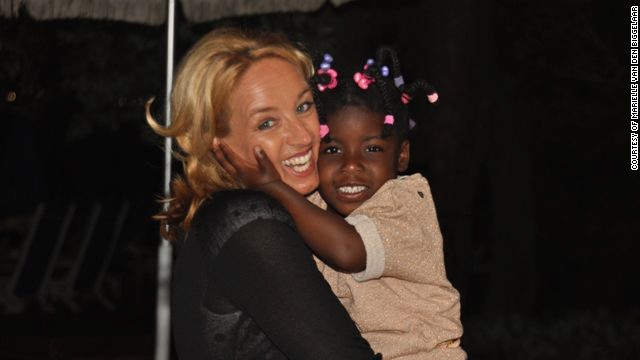
Marielle van den Biggelaar with her 4-year-old daughter, Eva, who was adopted from the U.S.
Some of the parents at
the June picnic were same-sex couples. With laws in some states allowing
gay marriage and adoption, the United States is one of the few
countries from which gays and lesbians can adopt, and many U.S.-born
children sent to the Netherlands have been adopted by same-sex families,
according to Anneke Vinke, a Dutch adoption expert at the University of Leiden.
In the last five years, 17% of the U.S. children that Goldstein helped
to place with foreign families were adopted by gay couples.
"Bluntly, the U.S. is
probably the only country that will allow a gay couple to adopt a
child," Goldstein said, adding that some states allow couples, gay or
straight, to adopt whether they're married or not. "So the gay families of
the world, when they can't adopt in their own countries or don't want to
necessarily, and want to adopt a baby, they're going to turn to the
U.S."
Why the Netherlands?
Reliable data on
overseas adoptions of American children is hard to come by. Last year
the U.S. State Department officially reported that 99 American children
were adopted by foreign families. But the real number is almost
certainly higher, said Peter Selman, an expert on international adoption
at Newcastle University in the U.K. who acts as a statistical adviser to the U.N. body that oversees international adoptions. For example, in 2010 the
U.S. State Department counted only 43 U.S. kids who were adopted
overseas, but the same year five countries -- Canada, the Netherlands,
Germany, Switzerland and Ireland -- reported adoptions of 205 children
born in the U.S., Selman said. According to statistics by receiving
countries, there were 126 U.S. children adopted overseas in 2004,
steadily rising to 315 in 2009.
Most American families were, and still are, interested in adopting a white infant Steven Kirsh, past president of the American Academy of Adoption Attorneys "The United States has
sent an increasing number of children for overseas adoptions in recent
years," Selman said. Goldstein, the New York attorney, also says that
the number of outgoing adoptions he facilitates now is higher than a
decade ago. The State Department's
system for tracking international adoptions only includes reports from
certain adoption providers, such as those accredited under an
international treaty known as the Hague Convention,
a spokesperson said. Other adoptions involving U.S. children, like
those completed through the foster care system, are not counted. "In
order to address that shortcoming, we have increased our outreach
efforts to encourage receiving countries and public domestic authorities
to report the outgoing adoption information to us," State Department
spokesperson Elizabeth Finan said by email.
Canada is the number one
destination for children adopted from the U.S. -- 148 went there in
2010 -- likely owing to its proximity, experts say. But the Netherlands
has consistently ranked second each year; about 250 U.S. children were
adopted by Dutch families from 2004 to 2010. The popularity of
American children for Dutch families appears to have grown by
word-of-mouth after Steven Kirsh, the Indiana adoption attorney, helped
an acquaintance's sister -- who lived in the Netherlands with her Dutch
husband -- adopt from the U.S. in the 1990s. Similarly, Goldstein began
providing adoptions for the Netherlands after a Dutch family working for
the U.N. sought his help for a U.S. adoption.
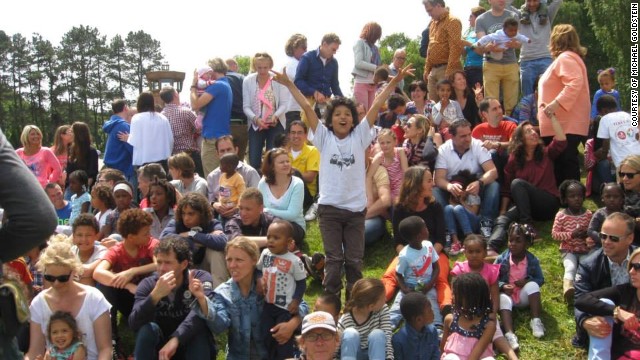
Adoption attorney: 'The Dutch families were just interested in adopting
an infant. The color of the child's skin didn't matter to them.'
"Most American families
were, and still are, interested in adopting a white infant. The Dutch
families were just interested in adopting an infant. The color of the
child's skin didn't matter to them," said Kirsh, former president of the
American Academy of Adoption Attorneys.
"We were getting some incredible families adopting -- just the best of
the best. It was easy for the birth moms to fall in love with these
couples."
Children with special needs
Following the decline in
international adoptions, most children being adopted from overseas are
defined as having special needs, such as developmental disabilities. The
U.S. babies are often not special needs children, although some states
prioritize adoptions for non-Caucasian children. U.S. babies going to
the Netherlands might have a "minimum exposure to drugs, but usually
some kind of lighter type of drugs like marijuana," said Goldstein. Susan's son was exposed
to crack cocaine during the first 10 weeks of her pregnancy, but he has
been lucky. "The doctors have said there are absolutely no side effects
from the drugs," she said.
Kirsh says the most
common misconception about birth mothers is that they turn to adoption
because they want to get rid of the baby or don't love the child. For
Susan, adoption was a last resort. "I tried to get family
but I had nobody to take my kid. My grandmother was too old; my father
had just had a major heart attack. I had nobody to take him." She even
turned to an abusive ex: "I even begged him. I had nobody. Nobody."
Foster care wasn't an
option either: "As the former crack-addicted prostitute that I was, I
had seen so many girls that went through foster care, and the abuse and,
you know, it's awful. It's awful there."
"I didn't want to keep
him in foster care. It's not fair. It's not fair for me to think: Well,
you know what, one day I might get my life together. Well, you know
what? Your life is not together now and your baby needs love now."
An open adoption
Foreign families are
generally more willing to have some level of openness than American
families, according to Kirsh, and this can make them more attractive to
birth mothers. "The Dutch families would, for example, want the birth
mother to help name the child, because they wanted the child to have
that connection to the birth mother. Almost never does an American
family do that." Dana Naughton, an adoption researcher at the Pennsylvania State University
said that the foreign families were involved in some of the first open
adoptions in the U.S., where a culture of secrecy around adoptions was
once common and children may not even have known they were adopted.
"In some ways these
adoptions are pioneering international open adoption. That's not a
process that's common in terms of communication between adoptive
families and birth families. And to varying degrees it is what underpins
this process," Naughton said.
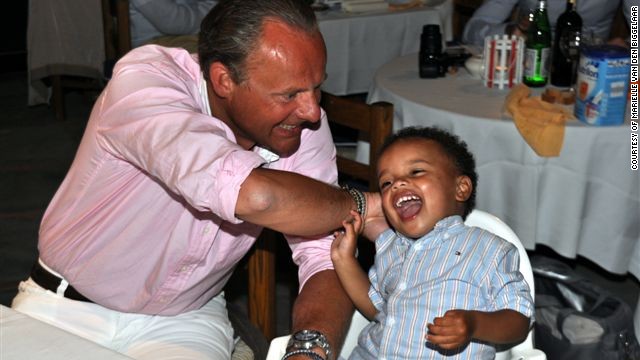
Marnix van den Biggelaar with his 2-year-old son, Norbert.
For Dutch parents,
adopting a U.S. child is luck of the draw -- and the birth mothers hold
all the cards. The biological mother of the van den Biggelaars' first
child, Eva, chose them as adoptive parents just nine weeks before the
baby was due, and Eva arrived three weeks early. "Instead of nine months
of pregnancy... we had six weeks only to prepare for a baby -- that was
really crazy," says Marielle van den Biggelaar. The van den Biggelaars
sent their "dear birth mom" letter to Goldstein, the adoption attorney,
in November 2008 and were chosen by Eva's birth mom three months later,
in January. The family declined to disclose how much they paid, but in
general the amount for Dutch families ranges from $35,000 to $50,000,
according to Goldstein.
Two-year-old Norbert is
at preschool now and already takes judo lessons, which his mother
describes as "all these little guys, two years old, tumbling through the
room in little white suits." His four-year-old sister, Eva, is "really
sweet and really protective and also sometimes really naughty but that
belongs to her age I think," she said. Their children
comprehend the basics of their adoptions -- they were born in a
different country and "out of the belly of a different mom" -- and the
van den Biggelaars are saving the details for when the children are "old
enough to understand and to know what happened and why it happened." But those explanations
can wait. "They're really cute together, they really love each other,
and that's really nice to see," their mother said.
Meeting her birth family
One of the advantages
for the parents of Elisa van Meurs in adopting from the U.S. was the
access to information about Elisa's mother and her medical background.
"I can always find her because I have the social security number. I have
one sister and she lives in the U.S. so it's not a strange country to
me, whereas China is -- and I can't understand Chinese," Bart van Meurs
said.
Since Elisa was a baby,
her parents have sent a letter and photographs to her biological mother
each year through the Kirsh & Kirsh adoption agency. In 2011, curious to know
more about her origins, Elisa traveled to Florida to meet her
biological mother and her extended family. Elisa's birth-grandmother and
mom told the van Meurs that they were willing to meet Elisa anywhere in
the U.S. and Elisa mentioned she would like to meet close to
Disneyworld.
Elisa had one wish. She
wanted to meet all her family members on this first "meet and greet"
except her birth mom. "She thought it would be too much for her to also
meet her birth mom then," said van Meurs. She met her birth mom the next
morning at Gatorland, a small theme park.
Meeting them was strange
at first and she was astonished to recognize familiar features in her
mother and grandfather's faces. "My nose is the same!" she said. She's
glad that they
met: "For me, it feels like happiness because I really wanted to know
how they looked like (and) because they really know how you are." But
now they just go on with their lives, she said, except for the
occasional call on Christmas Day and they became Facebook friends. "If
(I) go there maybe too much, my mother will miss me or something like
that."
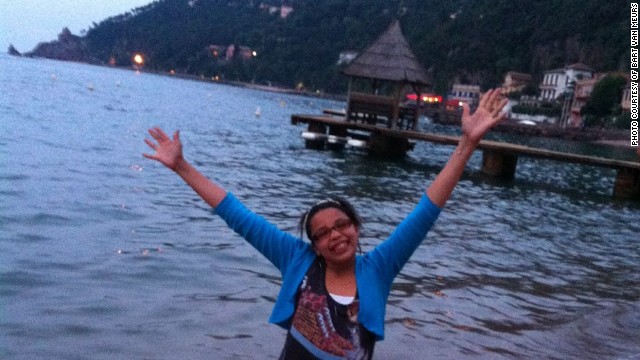
Elisa van Meurs on a family holiday to Cap d'Antibes, France in May 2012.
Asked what she thinks
her life would be like had she not been adopted, Elisa said, "I never
thought about it, because now I live here." While she looks forward
to traveling to the Alps, her favorite holiday destination is America.
Every two years or so, they visit Bart van Meurs' sister near Detroit,
Michigan, where Elisa enjoys roller-skating, eating hamburgers and
French fries, "all the bad stuff," she said. "In America I feel at home, and when I'm in Holland I feel at home, too."
Sobriety after prison
In Florida, Susan has
been out of prison and sober for four years. She works several jobs, has
an apartment and is raising her three-year-old daughter with her
fiancée, the girl's father.
She and her American
family stay in touch with her son, now 7, and his adoptive family in the
Netherlands. They send DVDs and photo albums, and traveled to the U.S.
in 2011 and again this February. Susan's daughter, the one who rejected
her son before his birth, has even had a change of heart. "She doesn't
care about the race anymore," Susan said. "She loves her brother."
It's not always easy for
Susan to see photos of the son she gave up. "There's always something
missing. There's always something gone but I am glad I get to see him
growing up. Yes, I am."
And she loves the boy's
adoptive parents, especially his mother. "I love her to death. She is
just... she's his mom, and that's amazing to watch. "I don't want girls to
be scared," Susan said of other birth mothers considering giving their
children up for adoption. "This isn't an ending. It's a beginning. For
me, I thought it was the end of the world, and it wasn't.
"I never thought it would be like this."
CNN's Kevin Voigt contributed to this article
No comments:
Post a Comment